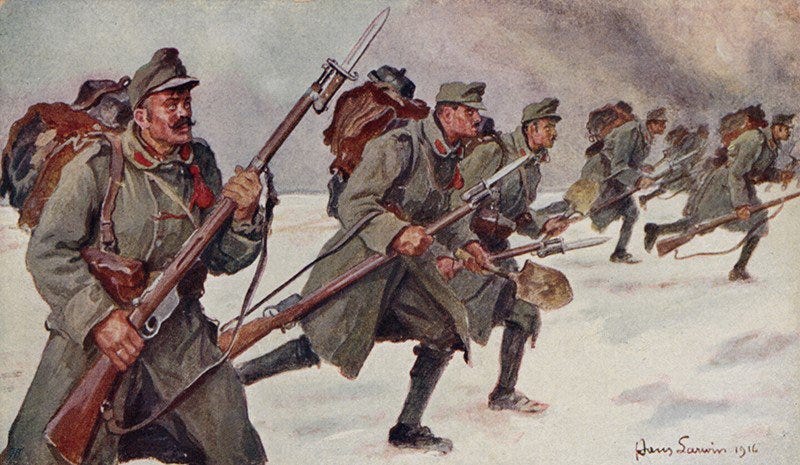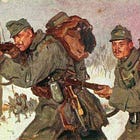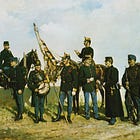Combat Orders (I)
FMS D-0268
This study was written for the US Army Foreign Military Studies program at the interrogation and debriefing center at Garmisch in April 1947. The author, Lothar Rendulic, served in the armies of the Hapsburg Empire, the first Republic of Austria, and Germany.
Our service regulations contained some information about the technique of combat orders, whereas they placed little emphasis on their psychological aspects. Rather than elaborate on the latter topic, I shall dwell on certain relevant principles which in my experience demonstrated their validity throughout several years of the war.
The combat order constitutes the primary instrument used by a commander to trans- late his decision into action. For this reason the combat order deserves to be formulated only with the most painstaking care.
There is an essential requirement which must govern the contents of the order: every subordinate commander to whom the order is addressed must be fully, or at least adequately, qualified to command his unit. Thus we arrive at the first principle: the senior commander must formulate his orders so as not to interfere with the command functions of his junior. He must not tie the subordinate to his apron strings or trespass on his initiative.
The temptation to interfere manifests itself must strongly at the time the first two operations or combat orders are issued. This interference finds expression either in that the order issued to the junior commander contains more detailed instructions than are absolutely necessary, or that the senior commander tends to prescribe even the manner in which the mission is to be executed.
Depending upon the degree of interference, the senior commander thus more or less assumes personal command of the junior commander's unit, and, by the same token, the junior is reduced to a mere instrument of execution, who is given a greater or lesser degree of opportunity to make his own decisions and exert his own free will.
In addition, the junior commander's responsibilities are curbed, a restriction which by necessity affects his sense of responsibility and hampers his initiative. Such meddling, aside from producing the last mentioned disadvantages, will also have a detrimental effect on the manner in which the command over the subordinate unit is exercised.
We all know that combat produces a constantly changing situation, which continually calls for decisions, and often very quick ones. Under these conditions it will be well nigh impossible for the senior commander to interfere with the command over the subordinate units in the same domineering fashion as he did in the beginning of the action. The subordinate commander who up to this time has received combat orders encroaching upon his command functions is bound to feel insecure once such orders fail to reach him. The almost invariable result is that the subordinate commander's ability to make decisions and act independently suffers a serious setback.
In addition to its adverse psychological effect, this manner of issuing combat orders will also be of disadvantage in actual practice. A subordinate commander in charge of a unit can survey his own and the enemy situation, the calibre of his own subordinates, the terrain, and all other factors of importance for a combat action in much more detail than a senior commander who has charge of a number of such units. The advantage -- which we may well underestimate -- of this detailed survey will be lost, if interference with the command functions of the subordinate is carried very far.
Thus, the manner of issuing combat orders must not tend to restrict or destroy the subordinate commander's initiative, and his ability to take independent action to make decisions. On the contrary, these qualities must be given as much of an opportunity to develop and produce results as may be permissible within the scope of the overall situation. The competency, decisiveness, and initiative of both senior and junior commander must be added together, and only the sum total of these qualities can produce the greatest possible results.
Another example -- even more glaring -- of unwarranted interference is seen when the subordinate is told where to set up his command post. Chances are that in the attack this kind of interference was only practiced in rare instances. The selection of the command post is one of the prerogatives of each unit commander. In designating his command post, he considers the situation, his mission, the terrain, and his own ideas, which will guide him in exercising his command function whenever the occasion arises.
Orders specifying the location of command posts, as required by the French service regulations, render the conduct of operations rigid and cumbersome. As for restricting the free choice of a command post, I can sanction it only in one exceptional instance. This instance would cover a critical defensive situation, in which the withdrawal of a command post could be made subject to the approval by the senior commander. My reasoning is based on the fact that not every commander's nerves can stand the strain of very critical situations, particularly in the defense, and that the withdrawal of a command post in such situations may -- and, for that matter, does -- cause the troops engaged in heavy combat to be unduly alarmed.
On the other hand, the senior commander can not always avoid issuing detailed instructions, which decidedly interfere with the command of the subordinate unit. Taking such measures is unavoidable in situations which require the co-operation of various arms not subordinate to each other, for instance, co-operation of infantry divisions with armored units, or of infantry divisions or armored divisions with air force units. In situations of this kind all such detailed instructions as are necessary to ensure co-operation have to be issued by the two senior commanders, a procedure which may frequently lead to interference in the normal function of these units.
I should only like to call attention to the different kinds of terrain which infantry or armored units, fighting independently, would select for their respective points of main effort [Schwerpunkte], or to the hour of the day or weather conditions which infantry and armored units, fighting independently from the air force, would favor for an attack.
Co-operation calls for compromises. Co-operation should not be permitted to depend solely upon the attitudes of those arms for one another. The attitude of one arm towards the other will still determine the settlement of numerous minor details, because such a settlement cannot be effected by orders from above.
Interference from above will be mandatory whenever a special co-operation between adjoining units is to bring an operation to a successful conclusion. In such instances, the fixing of the common point of main effort, just to name one example, can hardly be avoided. Here, too, a positive attitude on the part of either unit will not do the trick.
On the other hand, orders should not be too limited in scope. The chapter "The Command Decision" outlines to what extent the greater or lesser clarity of the situation the degree of accuracy in a combat order, particularly the part dealing with the mission.1 As the result of the lack of clarity in a situation, the mission can only be assigned in the form of general instructions.
If this modus operandi, however, is still observed after the situation has been clarified to such an extent as to permit as accurate description of the mission, the commander's adherence to procedure testifies to his lack of purposefulness and initiative. On one occasion in Russia I had to launch a flanking thrust. When this thrust was well under way, I asked my superior how far the thrust was to be carried, and received the following reply: "As far as you consider it expedient." Although I was well pleased with this response which permitted me complete freedom of action, I nevertheless felt that the decision as such was ill advised.
If orders take account of the subordinate's personality, they may, to a limited extent, give him a free hand. This liberal attitude, however, must never go so far that deci- sions which affect the command of a unit are placed entirely into the hands of a sub- ordinate commander. Even in those instances that require that an order be couched in general terms, such an order must still show assurance and precision on the part of the superior.
As for the subordinate, the order must not delegate that responsibility to him which the superior himself can assume on the basis of the prevailing situation. The junior commander must always gain the impression from the order issued to him, that his superior actually exercises his command function and does not drop the reins, even if the situation is unclear.
In issuing orders, one would do wrong to demand the impossible in order to accomplish the possible. On one occasion, an attack order issued to my division did not name a single objective that could have been reached in one day, even if the enemy had not contested our advance. Upon reading the order, an officer on my staff, which consisted of very courageous soldiers, shook his head and said: "If we gain only half that much ground, we can be well satisfied." Unreasonable demands tend to undermine confidence in the superior, because his subordinates will gain the impression that he lacks insight into the situation and its possibilities.
On the other hand, orders must not be too narrow in scope. They must at least cover as much ground as may be encompassed by a conceivable development of the situation. My division, facing east, was for several weeks engaged in position warfare with the Russian forces occupying strongly fortified positions six kilometers west of the Dnepr River. When the offensive was resumed along the entire line, my division, on 15 August 1941, received the order to break through the Russian positions and cross the Dnepr near Rochagev.2
The order, however, did not mention anything about the continuation of the drive east of the Dnepr, although the situation on the east bank was by no means such that the axis of attack was a matter of due course. The division succeeded in breaking through the positions held by the Russians, who, unnoticed by us, had withdrawn the bulk of their forces the previous night. A divisional motorized force which had been held in readiness had managed to reach the Dnepr near Rochagev and to seize the bridges intact.
I was with the motorized force. Soon after the capture of the bridge, the infantry units reached the river. Since in exploiting the situation it was imperative that every available force cross the river as quickly as possible and follow on the heels of the enemy, I had to determine the axis of advance on my own initiative. I aimed this thrust towards the southeast, thus deviating from the direction which had been followed up to this time. Under proper command procedure, this decision would not have been up to division, but to corps as the higher echelon.
The four components of this article can be found below:
The Command Decision (FMS D-080a) is another one of the many reports that Dr. Rendulic wrote for the Foreign Military Studies Program.
At this time, Dr. Rendulic commanded the 52nd Infantry Division.









